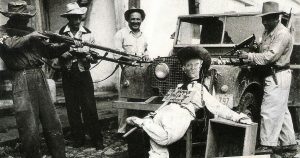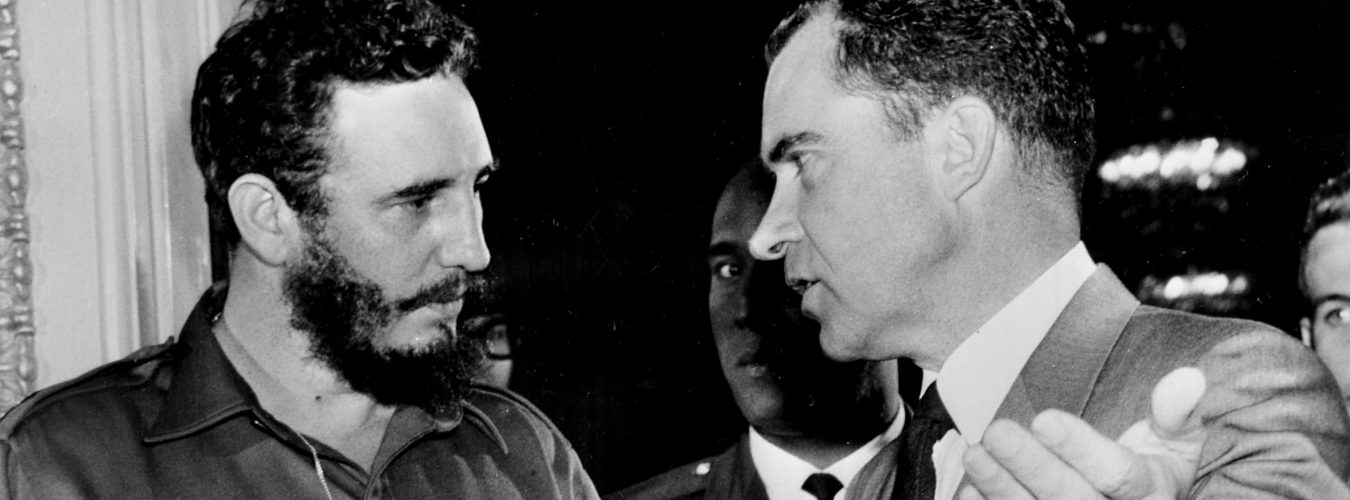
The battle for Guatemala
In June 1954 the Eisenhower Administration supported a Central Intelligence Agency led coup to overthrow the Guatemalan President Jacobo Arbenz Guzman. CIA director Allen Dulles viewed Arbenz’s policies towards nationalizing Guatemalan resources as a communist threat and organized an invasion based on Honduran and Nicaraguan soldiers. The coup was effective: Arbenz abdicated and the U.S backed Guatemalan rebel leader Castillo Armas rose to power.
The Fundamental Purpose of the U.S.
In April 1950 The United States Objective and Programs for National Security, also known as NSC-68, was drafted and heavily influenced American Foreign policy during the Cold war. With the encouragement of the NSC-68 the U.S government focused on providing underdeveloped countries with financial aid to boost economic and social development after the American model, forming a bulwark against Soviet politics. By 1954 Latin America countries were turning towards authoritarian forms of government, and as the cold war started to dominate political discourse in the south, there was a rising concern of communism in Latin America and the proximity to American interests. As is the fundamental purpose of the U.S to fight when necessary to protect their democratic way of life, as laid out in the NSC-68, the U.S began to involve itself in the affairs of Latin America for fear of communist encroachment. The belief that the Arbenz government presented a communist threat began with the nationalization of Guatemalan lands that were tied to American interests, but were amplified when Arbenz purchased arms from communist Czechoslovakia. It was the loose connection between the democratic Arbenz, local communists and the Soviet Union that ignited Dulles to move towards a plan to overthrow the Guatemalan president. In the perspective of U.S foreign policy, the idea of a communist state in Latin America was an apparent violation of the Monroe Doctrine and presented a hostile-power encroachment in the Western Hemisphere, endangering U.S national security.
Media Reactions
The New York Times posed a critical perspective towards the Guatemalan Coup. In the beginning of one of their articles they start by discussing the wide repercussions the U.S will have by its involvement in Guatemala affecting the “ relations among the American states and possibly in the United Nations.” The New York Times was closely reporting the events that were occurring in Guatemala, from the first sparks of trouble, to providing background to the President Arbenz, to current events that were erupting a “reign of terror” as Dulles saw in Guatemala. Their article released on June 20th, in the midst of the coup, depicts the actions of the U.S in Guatemalan affairs as giving fuel to Communist propaganda, reinforcing their idea of “U.S. Imperialism.” The rhetoric presented in the article criticizes the U.S for their provocative actions in Guatemala, sending arms to rebel groups in Honduras and Nicaragua and closing off all arms shipments to Guatemala, but then when Guatemala charged foreign aggression, the U.S feigned ignorance, “they assumed the American arms were not being used in Guatemala.” Furthermore, the idea that the U.S would be creating issues with their European allies was prominent, as many countries refused to aid the U.S in their involvement in Guatemalan affairs.
Sources
Bradley, Mark. “Decolonization, the Global South, and the Cold War, 1919–1962.” In The Cambridge History of the Cold War, edited by Melvyn P. Leffler and Odd Arne Westad, 464-85. The Cambridge History of the Cold War. Cambridge: Cambridge University Press, 2010. doi:10.1017/CHOL9780521837194.023.
Craig, Campbell, and Fredrik Logevall. “Leaner and Meaner.” Essay. In America’s Cold War, 155–157. 2012th ed. Cambridge, MA: Belknap Press of Harvard University Press, 2009.
“Guatemala Erupts.” New York Times (1923-Current File), Jun 20, 1954. 2, http://newman.richmond.edu:2048/login?url=https://www.proquest.com/historical-newspapers/guatemala-erupts/docview/112878959/se-2?accountid=14731.
“National Security Council Report, NSC 68, ‘United States Objectives and Programs for National
Security’,” April 14, 1950, History and Public Policy Program Digital Archive, US National Archives.
http://digitalarchive.wilsoncenter.org/document/116191
